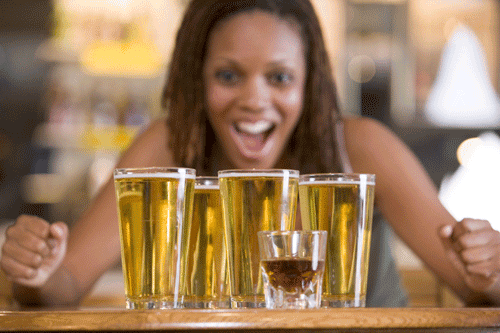Is Binge Drinking a Problem for You?
 by Devon Berkheiser, Psy.D.
by Devon Berkheiser, Psy.D.
Many people see binge drinking as a harmless activity…a good way to relax on the weekend after a stressful week, or a way to celebrate a special occasion. In some settings, such as on a college campus, binge drinking is considered by many to be the norm. However, binge drinking can have harmful effects and can even signify a serious alcohol problem. Read on to learn a little bit more about the potential dangers of binge drinking.
Some facts about binge drinking:
According to the Substance Abuse and Mental Health Services Administration (SAMHSA), a binge is defined as drinking five or more alcoholic beverages on a single occasion. Binge drinking is not uncommon in the U.S. In fact, the CDC estimates that one in six adults binges four times per month.
What are the risks of binge drinking?
Even an occasional binge can have harmful effects, such as alcohol poisoning, increased risk of injury (car crash, falling, drowning, sexual assault), and potential legal consequences (DUI, public intoxication). Regular binge episodes can lead to serious health problems, including liver disease, high blood pressure and other cardiovascular issues, and neurological damage. Additionally, binge drinking can make it hard to function at your best. During a binge, your blood alcohol concentration (BAC) is likely to be higher than 0.8. At this level, you will experience impaired judgment and decision making. You may also find yourself missing work or being less productive following a night of heavy drinking, for example. A binge episode may cause relationship problems, if you fail to fulfill your social roles and obligations. Clearly, binge drinking is not without risks.
Is binge drinking a problem for you?
Here are some warning signs that suggest your binge drinking may have become problematic:
- Experiencing regular blackouts
- Occupational problems as a result of binge drinking
- Relationship problems as a result of your alcohol use
- Legal issues
- Engaging in risky behavior during a binge
- Feeling unable to stop/reduce alcohol use
- Friends/family members express concern about your alcohol use
- Feelings of remorse/regret following a binge episode
How can treatment help?
If you have tried to stop or reduce binge drinking but have been unable to do so, or if the consequences of your binges outweigh the benefits, treatment (either residential or outpatient) may be a helpful option. Many people that engage in binge drinking may have underlying issues with stress management, anxiety, depression, or other mental health conditions. At Practical Recovery, you will be able to examine underlying factors that contribute to your alcohol use in a supportive and non-judgmental environment. You will also have the opportunity to learn healthier methods for coping with difficult emotions and other ways to socialize and relax. Call Practical Recovery today to learn more about treatment options, including inpatient and outpatient treatment, that are available.
